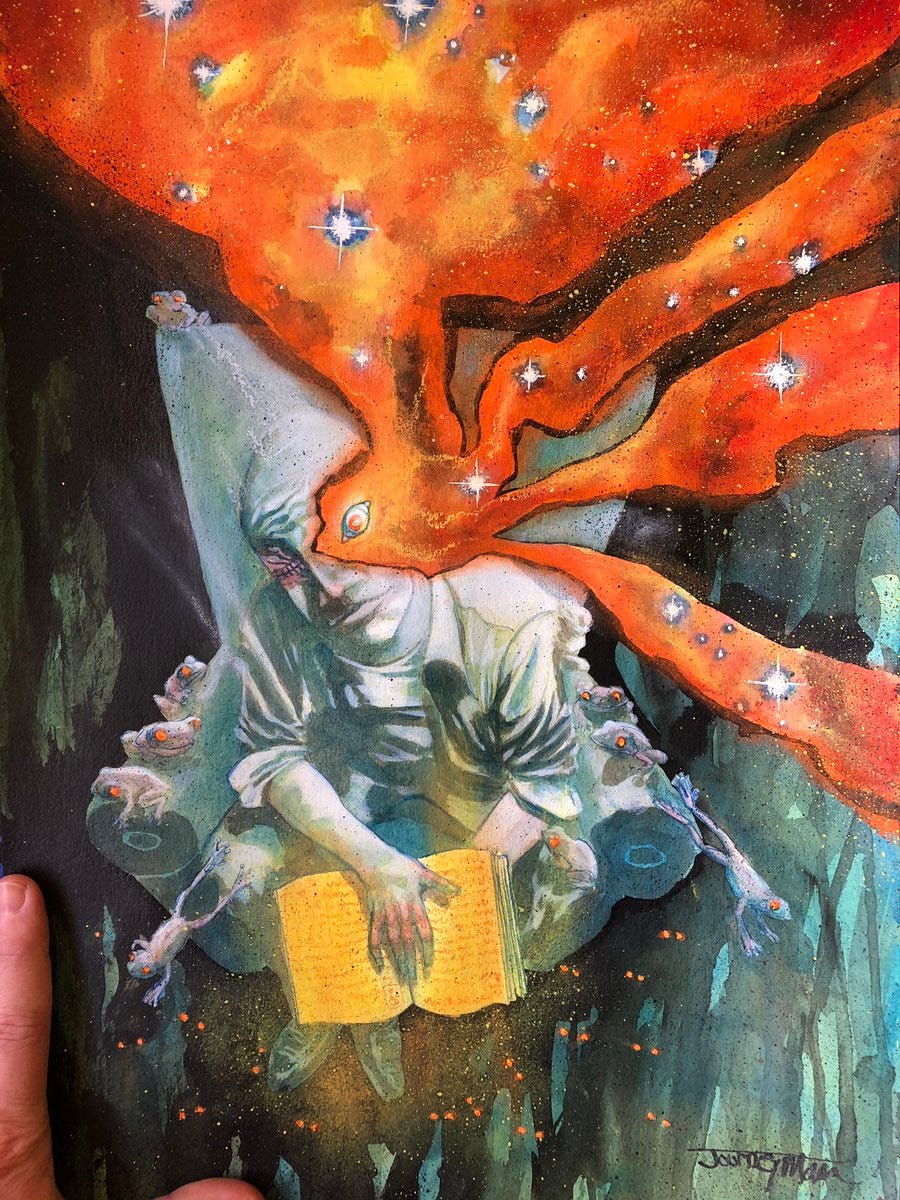The Cosmic Ordinary, or Session 2
Rules of the Post Human World
A Definition of the Post Human World (from Session 0):
So what is the Post Human world? It’s simple. The apocalypse that characters in the Cthulhu Mythos are always trying to prevent, happened. The stars were alright, the gods of Chaos awoke, reality warped, and humans mutated, but our core did not change.
You might have a third eye and an intelligent fungus as a roommate, but you still have to call your momma once a week, and you fight with the fungus over space in the fridge, and maybe once or twice in your life, something terrible happens, and you’re called upon to be a hero, as only an ordinary mutant can be, and that’s the Post Human condition.
“The Man Who Saw the World,” Painting by Journeyman
But Post Human Is Not Cosmic Horror
I have to start with this since Post Human might remind you of cosmic horror, the genre popularized by H.P. Lovecraft. You know it, right? Chaos gods with tentacles whose mere visage drives mortal men mad, and cults in little backwater towns attempting to awaken the Chaos gods, and there are monsters that look like fish people, and the more you know, the crazier you go.
Most of all, cosmic horror is fatalistic and nihilistic. Nothing matters because the human race loses in the end, and that end might come quicker than we think, but before you die, you’ll go insane, as will the rest of humanity.
I enjoy cosmic horror. I don’t think I could have conceived of Post Human without it, but I can’t accept the fatalism and nihilism at the heart of it as the basis for my world.
The Subversion of Cosmic Horror
Post Human subverts cosmic horror by asking a classic “What if?” question: What if humanity survived and even thrived in a much more chaotic world?
The end that cosmic horror posits, that the gods wake up, is instead the beginning of Post Human. Yes, the gods wake up, and yes, they warp reality and mutate humanity, but, now what?
I asked myself that question, and I realized that I did not want a post-apocalyptic wasteland story, but with tentacles.
Instead, I wanted to use Post Human and the tropes of cosmic fiction to write about the people and themes important to me, but with tentacles and mutant powers and such1.
The New Weird
There will be no typical monsters or powers or mutations in Post Human. All the tropes get turned around and inside out. This emulsion of Chaos and Order creates strange things that should not be, and often there is a contradiction or tension at the heart of each power, monster, mutant, and anything else of Order infected by Chaos, or anything else of Chaos captured by Order.
So, for example, a ghost in Post Human starts much like any ghost, as a restless spirit. But in Post Human, it clothes itself in ectoplasm and starts a new life. These ghosts are very resilient and possibly immortal, but if they meet anyone from their past life, they quickly start to dissipate and finally move on. Starting a new life without using the resources of their old life is difficult. Staying away from friends, foes, and family is even more difficult.
The Balance Between Order and Chaos
Humans always say something like, “When the gods came” or “when the gods woke up” to explain the arrival of the gods and the Chaos that came with them in their wake. The gods say “When the humans called us” or “when the humans entered the Dream” to explain the webs of Order from our minds and cultures that enticed and ensnared the gods of Chaos.
Mosaic Reality — The Broken Pieces
Let’s start with what’s different.
Reality ain’t what it used to be. It has been fractured, infused with chaos.
Indeed, each sentient being in the Post Human world has their own reality.
On a personal level, this means that people’s thoughts, feelings, desires, anxieties and so on manifest, at least temporarily, outside of their mind and in the physical space around them. This happens most often when a person is alone.
What applies to a person applies to communities as well. The more isolated they are and the smaller they are, the more chaotic they are.
This makes all isolated places — including the road — wondrous and terrible places.
Mosaic Reality — Putting the Pieces Together
Yet people have to come together and cooperate. When they do, their realities merge too. The process of creating that new reality can be traumatic, but once that new reality is created, people in community with each other can experience a more-or-less stable reality, at least until a new person comes along.
Mosaic Reality — The Metaphor
We all have our own version of reality. Post Human makes that concept literal, but that process of coming together, smashing your realities together, the trauma it can cause, but also the benefits of cooperation — all that is real life, as I see it.
The Cosmic Ordinary
There are no professional heroes, just ordinary people — ghosts, mutants, or otherwise — thrust into uncertain situations, trying to survive, and maybe being heroic along the way.
Next Post — The Rules of the Post Human Game (Part 1)
I know it sounds like I’m being flip, but the truth is that the real world is very important to me, but when I address it in fiction, I almost always add an alternate reality, magic, ghosts, etc…


